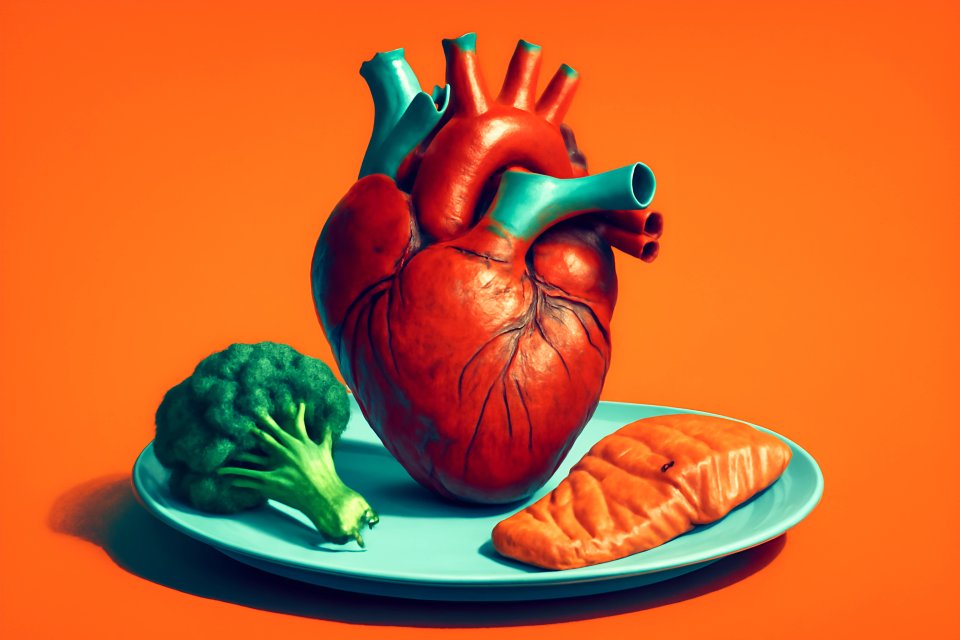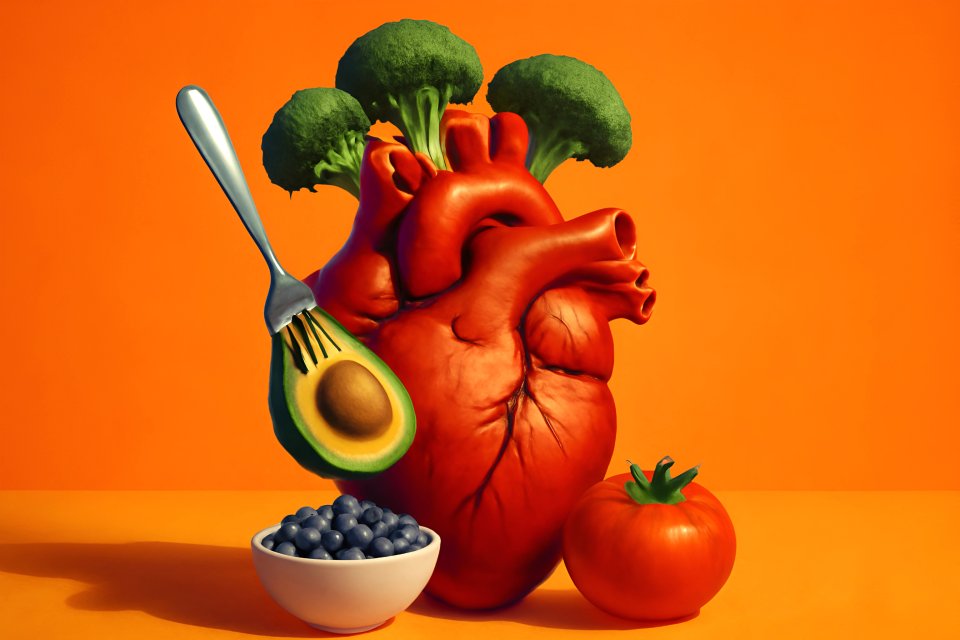
Feeling vibrant, energetic, and in control of your health as you sail past fifty? This chapter of life isn't just about wisdom; it's about renewed vitality and the power to shape your well-being. You've earned this time, and your body deserves the best care to make every moment count.
Why does heart health suddenly take center stage after 50? Our bodies naturally change, and the effects of lifestyle choices over the years begin to surface, making proactive care essential. But here’s the exciting part: you hold incredible power through nutrition for older adults and smart meal planning. This isn't about restriction; it's about embracing delicious, nourishing foods that fuel your heart and your life. This article will arm you with actionable meal planning tips for heart health after 50, making it simpler than ever to cherish your heart and live with boundless energy.
Why Your Heart Needs Extra TLC After 50
Think your heart just keeps ticking along, business as usual? As we age, our cardiovascular system undergoes subtle yet significant shifts. It's a natural process, but one that calls for a little extra attention to keep that vital organ in peak condition.
Understanding Age-Related Changes
Our bodies are marvels of engineering, but like any sophisticated machine, they experience wear and evolution over time. The Merck Manual explains that aging can lead to structural heart changes, such as thicker heart walls and stiffer arteries. These changes can mean your heart doesn't fill with blood as efficiently as it once did. Arterial stiffness can also elevate the risk of orthostatic hypotension, making things like hydration even more crucial.
These physiological shifts aren't a signal to slow down, but rather a call to smarten up our approach to health. While resting heart function often remains stable, the heart's responsiveness to exercise might decline. This underscores the importance of tailored physical activity and, critically, proactive nutrition for older adults to mitigate the progression of heart disease.
The Power of Prevention
Here’s the empowering truth: you are not merely a passenger on this journey. Nutrition is a cornerstone of prevention, a powerful lever you can pull to influence your heart's future. A fascinating NIA study revealed that optimal cardiovascular health at age 50 is linked to a 25% lower dementia risk and larger brain volume later in life. This highlights an undeniable connection between a healthy heart and a healthy mind.
The American Heart Association’s Life Simple 7 metrics, which include diet and blood pressure management, are strong predictors of long-term cardiovascular and neurological outcomes. Even small improvements in factors like blood pressure or cholesterol at midlife can yield significant benefits decades later. With over 43 million Americans over 60 having cardiovascular disease, the urgency for targeted nutrition strategies becomes crystal clear.
FitOverFifty Philosophy
At FitOverFifty, we believe it's never too late to embrace positive changes for long-term well-being and vitality. This isn't about chasing fleeting youth; it's about enhancing the incredible life you're living right now. Cumulative lifestyle factors, such as hypertension or diabetes, can exacerbate age-related cardiovascular changes.
But knowledge is power, and understanding these factors allows you to take decisive action. By focusing on heart-protective foods and smart eating habits, you're not just managing risk; you're investing in more energetic days, clearer thinking, and a future filled with possibilities. It’s about making choices today that your future self will thank you for.
Core Principles of Heart-Healthy Eating for the Over-50s
Ready to build an ironclad defense for your heart? It starts with what’s on your plate. Forget complicated rules and deprivation; the core principles of heart-healthy eating are about abundance, flavor, and smart choices that create a balanced diet for seniors.
Focus on Whole, Unprocessed Foods
Imagine your body as a high-performance vehicle; it runs best on premium fuel. For your heart, that premium fuel is whole, unprocessed foods. Think vibrant fruits and vegetables, hearty whole grains, lean proteins, and healthy fats – the kind of food your great-grandparents would recognize.
These foods are packed with the nutrients your heart craves, without the added sodium, unhealthy fats, and sugars often found in processed options. The American Heart Association (AHA) champions a diet rich in fruits, vegetables, whole grains, and fish, forming the bedrock of heart healthy meals. Making these foods the stars of your meals is the single most impactful step towards a healthier heart.
Key Nutrients to Prioritize
Let's zoom in on the nutritional superheroes that play a starring role in cardiovascular wellness. Ensuring these are plentiful in your diet can make a profound difference.
| Nutrient | Daily Goal (approx.) | Top Food Sources | Benefit for Heart |
|---|---|---|---|
| Fiber | 25-30 g |
Oats, legumes, fruits, vegetables | Lowers cholesterol, aids digestion |
| Omega-3s | Varies | Fatty fish, flaxseeds, walnuts | Reduces inflammation, triglycerides |
| Potassium | ≥4,700 mg |
Bananas, sweet potatoes, spinach | Helps manage blood pressure |
| Magnesium | 320-420 mg |
Nuts, seeds, leafy greens, quinoa | Regulates heart rhythm, blood pressure |
| Antioxidants | Eat a variety! | Berries, colorful vegetables, dark chocolate | Fights oxidative stress |
The AHA specifically recommends a fiber intake of 25–30 g/day from sources like whole grains and legumes to improve lipid profiles. A Harvard study on midlife diet highlights the role of omega-3s in mitigating inflammation, a key driver of heart disease. Furthermore, Cargill's research shows potassium-rich diets (aiming for ≥4,700 mg/day) can lower blood pressure, while Everyday Health notes that seniors require 320–420 mg/day of magnesium to help regulate heart rhythms.
What to Limit (Not Eliminate – "Sustainable" Approach)
Protecting your heart isn't about saying "no" to everything you enjoy; it's about smart moderation and making healthier choices most of the time. Think of it as a dimmer switch, not an on/off switch. The goal is a sustainable approach that you can live with and love.
Sodium is a big one; the AHA suggests limiting intake to less than 2,300 mg/day. This often means cooking more at home where you control the salt shaker and becoming a savvy label reader. Saturated and trans fats, often found in red meat, full-fat dairy, and commercially baked goods, should be minimized in favor of healthier unsaturated fats. Added sugars, lurking in everything from sodas to sauces, can negatively impact heart health, so awareness is key. Finally, highly processed foods tend to be high in all these culprits and low in beneficial nutrients, making them an infrequent indulgence rather than a staple.
Your Blueprint: Practical Meal Planning Tips for Heart Health After 50
Feeling overwhelmed by the idea of overhauling your diet? Don't be! Effective meal planning tips for heart health after 50 are about making small, manageable changes that add up to big results. This is your roadmap to making heart-conscious meal planning for seniors simple and even enjoyable.
Plan Your Week, Not Just Your Day
Ever find yourself staring into the fridge at 6 PM, wondering what’s for dinner? A little weekly planning can banish that stress and set you up for success. Think about your upcoming week and sketch out a few meal ideas.
Consider "Theme Nights" to simplify choices – perhaps Meatless Monday, Taco Tuesday (with lean protein and lots of veggies!), or Fish Friday. VIPcare suggests that themed nights can streamline grocery shopping and diversify nutrient intake. Batch cooking is another game-changer; spend an hour or two on a less busy day cooking a large batch of quinoa, roasting a pan of vegetables, or grilling chicken breasts to use in various meals throughout the week. Utilizing a simple paper planner or a meal planning app can keep you organized and on track with your heart-healthy goals.
Smart Shopping Strategies
Your grocery cart is your first line of defense in building heart healthy meals. Transform your shopping trips from a chore into a strategic mission for wellness. Start by becoming a label detective.
Focus on key numbers: sodium (aim low!), added sugars (zero is best!), saturated fat (keep it minimal), and fiber (aim high!). A great rule of thumb is to "shop the perimeter" of the grocery store. This is typically where you'll find fresh fruits, vegetables, lean meats, fish, and dairy – the whole foods that form the foundation of a balanced diet for seniors. Don't forget to stock your pantry and freezer wisely with heart-healthy staples like canned beans (rinsed to reduce sodium), frozen berries and vegetables (just as nutritious as fresh!), whole grains like oats and brown rice, and unsalted nuts and seeds.
Portion Control Power
Even the healthiest foods can contribute to weight gain if eaten in excessive amounts. Mastering portion control is a vital skill in your meal planning tips for heart health after 50 toolkit. It’s not about deprivation, but about awareness.
One simple trick is to use smaller plates and bowls; HumanCare NY notes this can reduce calorie intake by as much as 20%. Visual cues can also be incredibly helpful: think of a serving of protein as about the size of your palm, a serving of carbohydrates (like brown rice or quinoa) as about the size of your fist, and fill the rest of your plate with colorful vegetables. Pay attention to serving sizes listed on nutrition labels, especially for calorie-dense healthy foods like nuts, seeds, and oils. Finally, practice mindful eating: slow down, savor each bite, and listen to your body’s fullness cues.
Hydration is Key
Water, the elixir of life! Its importance cannot be overstated, especially when it comes to cardiovascular health. Proper hydration helps your heart more easily pump blood through the blood vessels to the muscles.
It also helps the muscles work efficiently. Dehydration can make your heart work harder. Aim to drink water consistently throughout the day. If plain water feels boring, try infusing it with slices of cucumber, lemon, or berries, or enjoy unsweetened herbal teas.
Making it Enjoyable & Sustainable
The most effective meal planning tips for heart health after 50 are those you can stick with long-term. This means your food needs to be enjoyable! Don't think you have to give up all your favorite dishes.
Often, you can make healthier swaps: use whole-wheat pasta instead of white, bake instead of fry, or use Greek yogurt instead of sour cream. Amp up the flavor with herbs, spices, garlic, and onions instead of relying on excess salt. Remember the power of fiber; a Harvard study found that high-fiber diets post-heart attack can reduce mortality risk by 25%, with cereal fiber like oats and barley showing significant benefits. Embrace the journey of discovering new, delicious ways to nourish your heart.
Sample Heart-Healthy Meal Ideas & Simple Swaps
Ready to put these principles into practice? Crafting heart healthy meals doesn't require a culinary degree. Here are some simple, delicious ideas and easy swaps to get you started on your journey to better heart health.
Breakfast Ideas
Kickstart your day with a powerhouse of nutrients. Try a warm bowl of oatmeal topped with fresh berries and a sprinkle of walnuts for fiber and omega-3s. Greek yogurt layered with fruit and a few slivered almonds is another quick and satisfying option. Or, opt for whole-grain toast with a smear of avocado and a poached egg for a mix of healthy fats, fiber, and protein.
These breakfasts are designed to provide sustained energy and keep you full until your next meal. They set a positive tone for a day of heart-conscious eating. Remember, a good breakfast can prevent those mid-morning cravings for less healthy options.
Lunch & Dinner Ideas
For lunch, a large salad loaded with colorful vegetables, grilled chicken or chickpeas, and a light vinaigrette is always a winner. A hearty lentil soup paired with a slice of whole-grain bread offers comfort and a fantastic dose of fiber. You could also try tuna salad made with Greek yogurt instead of mayonnaise, served on whole-wheat crackers.
When dinner rolls around, think baked salmon (rich in omega-3s) served with roasted asparagus and quinoa. A vibrant chicken stir-fry packed with broccoli, bell peppers, and carrots, served over brown rice, is both quick and nutritious. Don't forget plant-based powerhouses like a flavorful bean chili, which you can find inspiration for in American Heart Association’s certified recipes.
Snack Ideas & Simple Swaps
Snacks are an opportunity to sneak in more nutrients, not derail your efforts. A handful of almonds or walnuts provides healthy fats and magnesium; Senior Lifestyle highlights that these nuts can help reduce LDL cholesterol. An apple with a tablespoon of natural peanut butter offers fiber and protein. Baby carrots with hummus are a classic for a reason – crunchy, satisfying, and good for you.
Make simple swaps a habit:
White Rice -> Brown Rice or Quinoa Creamy Dressings -> Vinaigrettes Sugary Cereals -> Whole-Grain Oats Potato Chips -> Air-Popped Popcorn Sweetened Yogurt -> Plain Greek Yogurt with Fruit
The Mayo Clinic emphasizes that swapping white rice for brown rice increases fiber intake, aiding digestion and cholesterol management. These small changes can make a big difference over time.
Beyond the Kitchen: Lifestyle Habits that Complement Heart-Healthy Nutrition
Nourishing your heart extends beyond your plate. A truly holistic approach to heart health after 50 integrates other vital lifestyle habits. These work synergistically with your nutrition efforts to create a powerful shield for your cardiovascular system.
The Pillars of a Heart-Healthy Lifestyle
Regular, age-appropriate exercise is paramount. It strengthens your heart muscle, improves circulation, and helps manage weight. For guidance, explore how to build a low-impact exercise routine over 50 that’s both effective and joint-friendly. Stress management is another critical piece; chronic stress can wreak havoc on your heart. The American Heart Association warns that psychosocial stressors can independently raise CVD risk by 40%, so finding healthy coping mechanisms like meditation, yoga, or spending time in nature is essential.
Quality sleep is non-negotiable for heart health. During sleep, your body repairs and restores itself. Harvard Medical School research indicates that 7–8 hours of sleep nightly helps regulate cortisol and supports vascular repair. Don't underestimate the power of hydration either; an NIH study found that optimal hydration is linked to a 50% reduction in chronic disease risk and can slow biological aging.
Finally, regular check-ups with your doctor are crucial. Monitoring blood pressure, cholesterol levels, and blood sugar allows for early detection and management of any potential issues. These appointments are your opportunity to discuss your lifestyle changes and get personalized advice. Embracing these habits alongside your nutritional plan creates a comprehensive strategy for a long, vibrant, and heart-healthy life.
Conclusion: Your Heart, Your Health – Embrace Age-Defying Nutrition
Taking charge of your heart health through nutrition after 50 isn't just a good idea—it's an empowering act of self-love and a declaration that you're ready to live your most vibrant life. You now have the knowledge and the tools. The journey to a healthier heart is paved with delicious foods, smart choices, and the profound satisfaction of knowing you're investing in your future well-being.
Remember the FitOverFifty philosophy: this is about sustainable changes, not fleeting perfection. Every small, positive step you take with your meal planning tips for heart health after 50 contributes to a stronger, healthier you. The power to nourish your heart, boost your energy, and enhance your vitality is right there on your plate.
So, what's your first step? We encourage you to try just one meal planning tip this week – perhaps batch cook some quinoa or try a new heart-healthy recipe. We’d love to hear from you! Share your favorite heart-healthy meal ideas or planning tricks in the comments below. And, as always, consult with your doctor or a registered dietitian for personalized advice tailored to your unique health needs. Your heart will thank you for it.











